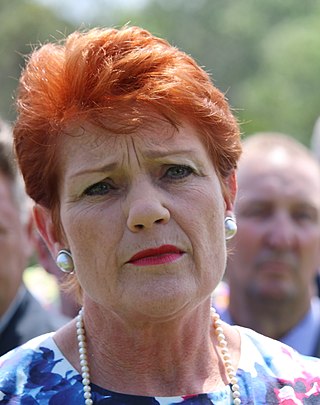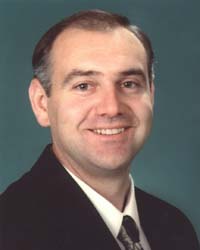
Pauline Lee Hanson is an Australian politician who is the founder and leader of One Nation, a right-wing populist political party. Hanson has represented Queensland in the Australian Senate since the 2016 Federal Election.

Hansard is the traditional name of the transcripts of parliamentary debates in Britain and many Commonwealth countries. It is named after Thomas Curson Hansard (1776–1833), a London printer and publisher, who was the first official printer to the Parliament at Westminster.

A speech from the throne, or throne speech, is an event in certain monarchies in which the reigning sovereign, or their representative, reads a prepared speech to members of the nation's legislature when a session is opened, or in some cases closed. The address sets forth the government's priorities for its legislative agenda, for which the cooperation of the legislature is sought. The speech is often accompanied by formal ceremony. It is often held annually, although in some places it may occur more or less frequently, whenever a new session of the legislature is opened.
David Ernest Oldfield is an Australian former politician who co-founded and was national director of the Pauline Hanson's One Nation party.

The speaker of the House of Representatives is the presiding officer of the Australian House of Representatives, the lower chamber within the Parliament of Australia. The counterpart in the upper house is the president of the Senate. The office of the speakership was established in 1901 by section 35 of the Constitution of Australia. The primary responsibilities of the office is to oversee house debates, determine which members may speak, maintain order and the parliamentary and ministerial codes of conduct during sessions and uphold all rules and standing orders. The current speaker of the House of Representatives is Milton Dick, who was elected on 26 July 2022.

The State Opening of Parliament is a ceremonial event which formally marks the beginning of a session of the Parliament of the United Kingdom. It includes a speech from the throne known as the King's Speech. The event takes place in the House of Lords chamber on the first day of a new session, which is usually in May or June, and traditionally in November, but can occur at any time of year depending on the timing of General Elections and parliamentary session start dates. It takes place in front of both Houses of Parliament. The monarch, wearing the Imperial State Crown, reads a speech that has been prepared by his or her government outlining its plans for that parliamentary year. The most recent ceremony was held on 10 May 2022.
Angela Lavinia Bray, Baroness Bray of Coln is a British Conservative Party politician who was the Member of the London Assembly for West Central from 2000 to 2008, and Member of Parliament (MP) for Ealing Central and Acton from 2010 to 2015.

Bernard Fernand Ripoll is a former Australian politician. He was a Labor member of the Australian House of Representatives from 1998 to 2016, representing the Division of Oxley, Queensland. In 2013, Ripoll was made Shadow Minister for Financial Services and Shadow Minister for Sport, on 15 September 2015 he resigned from the Shadow Cabinet position.
Parliamentary privilege is a legal immunity enjoyed by members of certain legislatures, in which legislators are granted protection against civil or criminal liability for actions done or statements made in the course of their legislative duties. It is common in countries whose constitutions are based on the Westminster system.
Martin Redmond was a British Labour Party politician from Doncaster in South Yorkshire.
The Norway Debate, sometimes called the Narvik Debate, was a momentous debate in the British House of Commons from 7 to 9 May 1940, during the Second World War. The official title of the debate, as held in the Hansard parliamentary archive, is Conduct of the War. The debate was initiated by an adjournment motion enabling the Commons to freely discuss the progress of the Norwegian campaign. The debate quickly brought to a head widespread dissatisfaction with the conduct of the war by Neville Chamberlain's government.

TheyWorkForYou is a parliamentary monitoring website operated by mySociety which aims to make it easier for UK citizens to understand what is going on in Westminster, as well as the Scottish Parliament, the Senedd and the Northern Ireland Assembly. It also helps create accountability for UK politicians by publishing a complete archive of every word spoken in Parliament, along with a voting record and other details for each MP, past and present.
Naming is a procedure in some Westminster model parliaments that provides for the speaker to temporarily remove a member of parliament who is breaking the rules of conduct of the legislature. Historically, "naming" refers to the speaker's invocation of the process by calling out the actual name of the member, deliberately breaking the convention of calling on members by the name of their constituency.
In the United Kingdom, confidence motions are a means of testing the support of the government (executive) in a legislative body, and for the legislature to remove the government from office. A confidence motion may take the form of either a vote of confidence, usually put forward by the government, or a vote of no confidence, usually proposed by the opposition. When such a motion is put to a vote in the legislature, if a vote of confidence is defeated, or a vote of no confidence is passed, then the incumbent government must resign, or call a general election.

Caroline Fiona Ellen Nokes is a British Conservative Party politician. She was first elected as the Member of Parliament (MP) for Romsey and Southampton North in Hampshire in the 2010 general election. Elected as a Conservative, Nokes had the Conservative whip removed on 3 September 2019 and sat as an independent politician until the whip was restored to her on 29 October.

Susan Elan Jones is a former British Labour Party politician, who was elected at the 2010 general election as the Member of Parliament (MP) for Clwyd South, replacing the previous Labour MP Martyn Jones after his retirement. She returned to the voluntary sector after leaving Parliament.

Albertus Johannes "Bert" van Manen is an Australian politician who has been a member of the House of Representatives since the 2010 federal election, representing the Division of Forde. He is a member of the Liberal National Party of Queensland and sits with the Liberal Party in federal parliament. He has been the party's chief whip in the House of Representatives since July 2019.

Robert Largan is a British Conservative Party politician, who was elected as the Member of Parliament (MP) for High Peak at the 2019 general election. He has been serving as Assistant Government Whip since October 2022.
Thomas Bilcliffe Fyler MP was a British Tory politician who represented Coventry in the House of Commons from 10 June 1826 to 25 July 1831.











